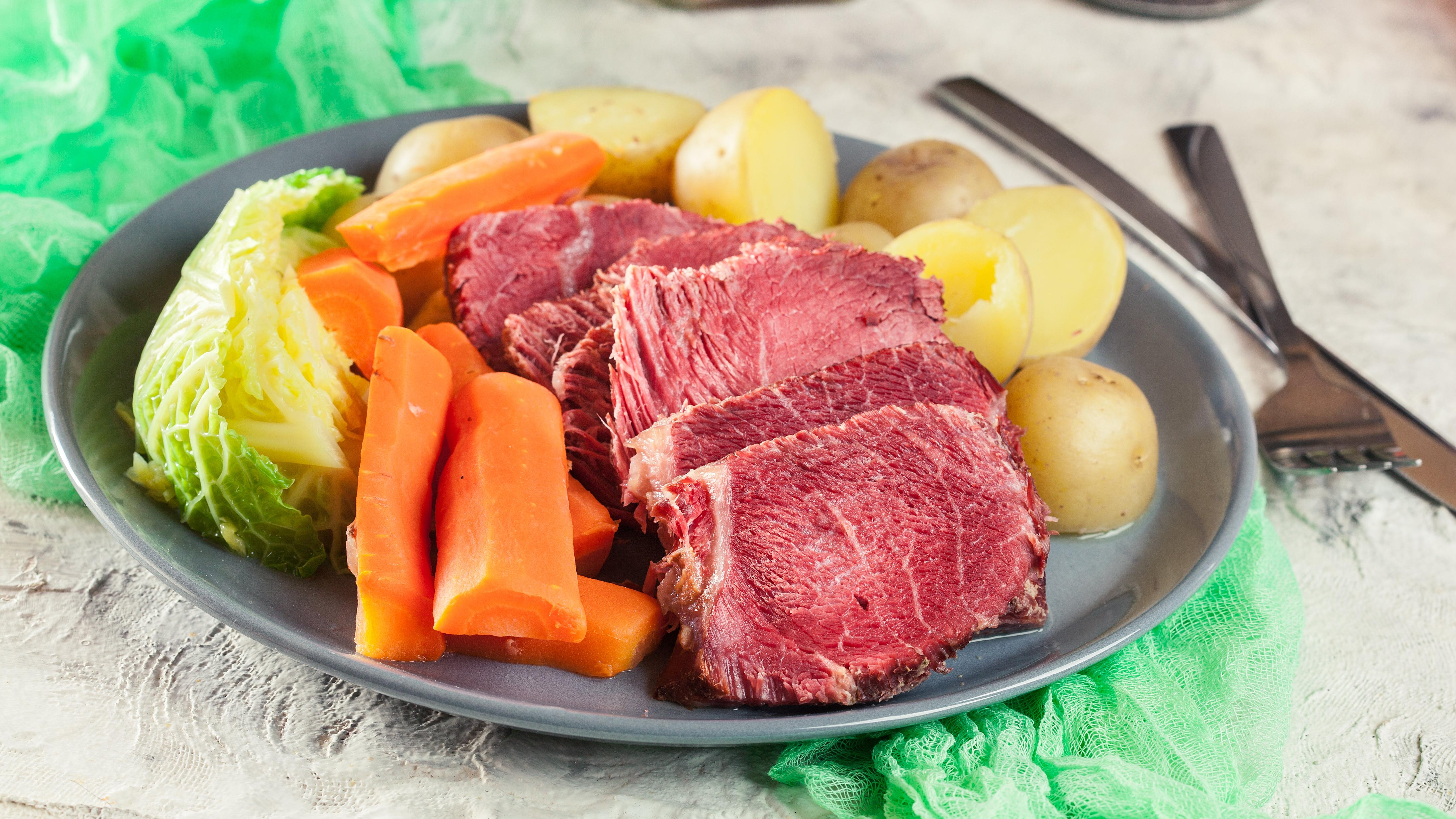God Is Fine With Corned Beef, Apparently
The Big Guy says it’s cool to eat meat next Friday—but there's a catch.
Usually, people make deals with the devil to get what they want when they know their heart's desire is not allowed. But as it turns out, God is open to negotiations, too.
Despite the tradition of abstaining from meat on Fridays during the holy season of Lent, the Archdiocese of Galveston-Houston practicing has given Catholics in the area a special dispensation for corned beef on St. Patrick's Day, reports ABC 13 Houston. While March 17 always falls during Lent, it only lands on a meatless Friday a small percentage of the time, and that includes the year 2023. Daniel Cardinal DiNardo, the archbishop granting this dispensation, asks that those who choose to take advantage of this corned beef green light make sure to do an extra act of charity or penance for their meat consumption. Note that the announcement says "in exchange." Literally making deals with God.
This year, St. Patrick's Day falls on a Lenten Friday. Cardinal DiNardo is granting a dispensation from abstaining from meat on March 17, 2023, for local and visiting faithful in the Archdiocese. https://t.co/h248hTW4FE pic.twitter.com/KD8F83v0aH
— Archdiocese of Galveston-Houston (@archgh) March 6, 2023
It's not just Houston, either. Similar decrees have been made by various Archdioceses of New Jersey, Pennsylvania, Louisiana, New York, Washington DC, Massachusetts—the list goes on. Here in Chicago, no dispensation was given, but there's nevertheless some gray area: The statement notes that "Catholics who find themselves at an event where meat is served in celebrating St. Patrick may in good conscience substitute the general rule of abstinence with another form of penance or a significant act of charity that benefits the poor."
As someone who attended a private Catholic school from preschool to 8th grade and a Jesuit high school and no longer practices any faith, I warn you I'm here to ruffle some religious feathers. All in good fun, of course.
A very brief history of the Lenten season
For those who do not observe Lent, here's the gist: Lent begins 40 days before Easter. The 40 days are symbolic of 40 days that Jesus spent fasting in the desert, avoiding the devil's temptations. In addition to abstaining from meat on Fridays during the Lenten season, Christians are also encouraged to give up something throughout the season as another way to connect with Jesus' sacrifice.
Pope Gregory is credited as being the one who, in the late sixth century, established that Christians should abstain from "all things that come from flesh," which included meat, milk, cheese, and eggs. Prior to that there was confusion surrounding the exact rules of fasting, and since then the rules have continued to change.
In 1966, the United States Conference of Catholic Bishops established that all Catholics 14 and over must abstain from meat on Fridays. At the ripe age of 14, you're not old enough to vote, smoke, drink, or drive, but you're damn sure old enough to suffer as Christ did. Yes, yes, it's all very Catholic.
How Lent is evolving
The thing is, this isn't the first time messengers of the Almighty have decided to play fast and loose with the rules of Lent. Prior to Pope Gregory's declaration, some fasted every day of the Lenten season, while others did it every other week.
Another little loophole of Lenten fasting is the fact that no one can fully agree on how the "40 days" part plays out. Lent begins on Ash Wednesday, which changes each year so that it begins 40 days prior to whichever Sunday Easter falls on, which can change dramatically from one year to the next. And if you include the Sundays of each week, then Lent is actually longer than 40 days. For this reason, people tend to give themselves a cheat day on Sundays to indulge in whatever thing they've given up.
Growing up, I recall my mom giving up lemonade, bread, tortillas, and even swearing. Not every sacrifice was successful, but she tried her best. Demon child that I was, I usually gave up things that weren't even truly a sacrifice to me. It was suggested plenty of times that I try giving up pickles for Lent, but even the promise of eternal life couldn't sway me on that one.
In recent years, modern Catholics seem to be treating the tradition of sacrifice like a Mulligan for any failed New Year's resolutions, and based on the PR emails regularly received by The Takeout, food and beverage brands use the season as an opportunity to market new plant-based or otherwise Lent-compliant products. In theory, the season lets people explore the nature of sacrifice, but even that has been de-emphasized in recent decades. I was also taught that rather than give up something, you could do something positive throughout those 40 days—but that's harder to define, and harder for anyone to undertake. The truth is, we just don't want to be inconvenienced all that much.
Which takes us back to the matter of St. Patrick's Day 2023, when eating traditional corned beef and cabbage to honor a saint is colliding with our mandate to avoid eating meat. Which tradition is more sacred? Which one can be safely ignored? How did each Archdiocese determine whether God would be mad about us breaking a Lenten Friday rule? If you eat corned beef on March 17 just because you really like it, should you go out of your way to feel guilty about that choice? The answers to these questions are most likely to be found in prayer, or by double-checking your local church's Facebook page.
